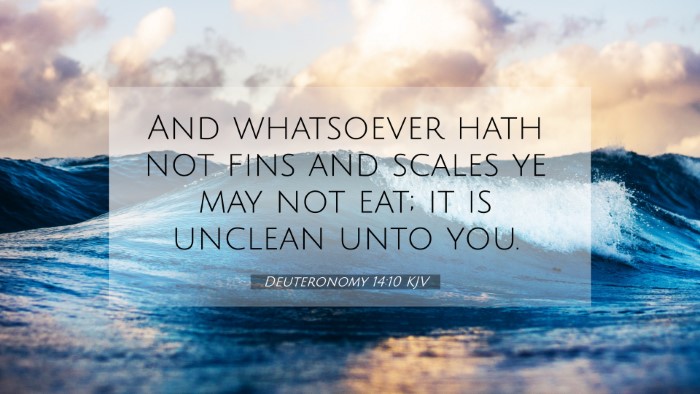Understanding Deuteronomy 14:10
Bible Verse: Deuteronomy 14:10 - "And whatsoever hath not fins and scales ye may not eat; it is unclean unto you."
Summary Interpretation
Deuteronomy 14:10 provides guidance on dietary laws within the context of Israelite culture. The verse specifically states that seafood lacking fins and scales is considered unclean, thus forbidden for consumption. This directive serves to delineate clean from unclean animals as part of the broader purity laws outlined in the Mosaic code.
Combined Insights from Commentaries
The following insights are drawn from the works of notable public domain commentators, including Matthew Henry, Albert Barnes, and Adam Clarke.
Matthew Henry's Commentary
Henry explains that this law reflects God's desire for His people to maintain purity in every aspect of their lives, including their diet. The distinction between clean and unclean animals highlights spiritual truths, encouraging the Israelites to reflect God's holiness. This dietary law was not merely about physical health but also served as a reminder of their covenant relationship with God.
Albert Barnes' Notes
Barnes emphasizes the specific criteria (fins and scales) that classify fish as clean. He notes that these restrictions fostered a sense of community and identity among the Israelites, setting them apart from surrounding nations. Additionally, Barnes observes that these dietary laws have implications for spiritual health, as what one consumes can affect one’s spiritual life.
Adam Clarke's Commentary
Clarke adds that the laws concerning clean and unclean creatures are deeply rooted in the concept of obedience to God’s commands. He suggests that the rationale behind these prohibitions may also relate to the cultural perceptions of the animals themselves, particularly in ancient Near East societies. To Clarke, the deeper understanding lies in submitting to God’s will in all facets of life, thereby maintaining sanctity.
Cross-References for Deuteronomy 14:10
This verse connects to several other scriptures that share similar themes of dietary law and purity:
- Leviticus 11:9-12 - Similar dietary rules regarding clean and unclean sea creatures.
- Isaiah 66:17 - Speaks of those who consume swine's flesh and the consequences of defiling God’s purity.
- Acts 10:14-15 - Peter's vision concerning clean and unclean animals, illustrating a shift in dietary restrictions in the New Covenant.
- 1 Corinthians 10:31 - “Whether therefore ye eat, or drink, or whatsoever ye do, do all to the glory of God,” highlighting the spiritual significance of dietary choices.
- Mark 7:19 - Jesus comments on what truly defiles a man, indicating a new perspective on dietary laws.
- Romans 14:14 - Paul speaks to the conscience about food, asserting that nothing is unclean of itself.
- 1 Timothy 4:4 - Referring to creation, affirming that everything created by God is good, including food, if received with thanksgiving.
- Deuteronomy 14:3-21 - Further elaboration of what is allowed and what is forbidden among animals.
Theme Connections
There are profound thematic connections between this verse and various aspects of the Bible regarding holiness, purity, and community.
- Holiness and Separation: The dietary laws articulate God’s call for His people to be set apart.
- Obedience: Following these laws reflects obedience to divine command.
- Spiritual Significance of Food: The discussions around food choices ultimately point to broader themes of spiritual health.
Utilizing Bible Cross-Referencing
For deeper understanding, the Bible cross-reference system can be a valuable tool. Engaging in cross-referencing Bible study methods allows for:
- Identifying connections between Old and New Testament teachings.
- Understanding links between the dietary regulations and New Testament texts.
- Exploring similar passages that address purity and holiness.
Conclusion
In summary, Deuteronomy 14:10 encapsulates important teachings regarding dietary laws, serving both practical and spiritual purposes. Through a comparative Bible verse analysis, various scriptures illuminate the significance of these laws in maintaining holiness, reflecting God’s character, and fostering community among the Israelites. By utilizing tools for Bible cross-referencing, believers can expand their understanding of the connections between these laws and the broader biblical narrative.
Further Study
To dive deeper into the implications of dietary laws and their relationship to faith, consider exploring:
- Bible reference resources that focus on the theme of purity.
- Comparative studies of the teachings of Jesus and the Apostles regarding food.
- Detailed cross-references illustrating the evolution of law and grace.


